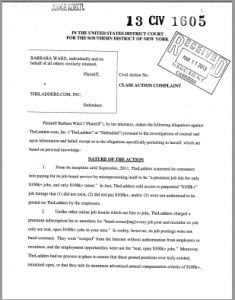In the February 12, 2013 Ask The Headhunter Newsletter, a frustrated reader loses her job, then asks for her personnel file. And the results might shock you:
I was asked to leave my job (not a good fit for the position) last fall. I requested a copy of my personnel file from my employer. I finally heard back and they are telling me that I need to travel to the company’s headquarters in another state to view it. It’s almost a 1,000-mile trip! They will not make copies. Do I have any recourse? Thank you.
Nick’s Reply
My view on personnel files is that, if it’s information compiled about you by your employer, you should have a right to see it. But my view isn’t the law. In fact, I never pretend to give legal advice since I’m not a lawyer, and I don’t want my ire to lead anyone into legal jeopardy.
 But this is such a good question that I turned to my friend Lawrence Barty for his comments. Get ready for some shocks.
But this is such a good question that I turned to my friend Lawrence Barty for his comments. Get ready for some shocks.
Larry is a retired attorney who specializes in employment and labor law, and particularly in employment contracts. Please note: Nothing in this column is legal advice for a particular situation, and laws vary depending on your jurisdiction. If you need legal help on a specific matter, consult with an attorney who knows the law in your state. Take it away, Larry…
Larry Barty: To start with, most employees suffer from a misconception: That is, they assume that their employee file somehow belongs to them. If fact, it does not. It is the employer’s file concerning the employee. To better understand that, assume a company maintains a file of correspondence and records concerning one of its customers. Why should the customer have the right to see what is in that file? So, with respect to employment files, the key fact is that the file is the employer’s, not the employee’s. So, the question properly phrased is, under what circumstances, if any, may an employee view that particular employer-owned file?
The answer to the question is that the employee may see that file without the employer’s permission only if a State law so provides. Without a State law giving the employee a right to see the file, the employee is at the mercy of the employer. Only about a third of the States have any laws concerning the right to view or copy employment files. (Employee medical files, as opposed to employment files, are often made available by State law). In the remaining two-thirds of States, the employee’s only “right” is whatever may be set forth in the employer’s rules or handbook.
In those States that do have laws permitting employees to see their files, the conditions vary widely. For example, California law provides that an employee may view any personnel record relating to performance at reasonable intervals, but only on the employee’s own time. The employee may copy records, but only those records that bear the employee’s signature. In Illinois, by contrast, an employee may view the entire file and copy anything in it.
In California, Pennsylvania and most other States that authorize employee viewing, if the records are kept off-site the employee must go on his or her own to that off-site location. Only a few States, such as Michigan, require the employer to provide a copy for viewing at the employee’s work site.
As for getting a copy of the file, a few States, such as Maine, require the employer to give the employee a copy of the file at the employer’s cost. However, most States that authorize viewing require the employee to pay reasonable copying costs.
Former employees are almost out of luck
Now for the punch line to these laws. What Larry has discussed so far pertains to access of personnel files by current employees. Once you’ve left the company, things change. Larry explains:
“Former employees’ rights to see employee files are even more limited. Less than a dozen States permit former employees to view personnel files at all and, in most of those States, the right to view is limited to sometimes as little as only within 60 days after employment ends. If a former employee wants a copy of his or her file after that, a lawsuit would be required.”
So the news is not good for ex-employees. As you might expect, the law makes access to your former personnel records complicated — mainly because they’re not your personnel records, but also because the law varies depending on where you live and work.
How to protect yourself
 But this wouldn’t be Ask The Headhunter if we didn’t close with some useful advice that you’re probably not going to find anywhere else. Larry hands you a wonderful tip about how to get and keep the information you need:
But this wouldn’t be Ask The Headhunter if we didn’t close with some useful advice that you’re probably not going to find anywhere else. Larry hands you a wonderful tip about how to get and keep the information you need:
“The bottom line for all employees is that you should keep your own file. Keep copies of annual evaluations, notification of wage increases, letters or e-mail complimenting or praising your work and, perhaps most importantly, disciplinary notices. If you know that a document concerning you has been generated that might be important someday, ask for a a copy. I think that most managers will give you one.”
Thanks to Larry Barty for sharing his knowledge about personnel files. Please don’t construe anything he says as advice for your personal situation; it’s not. Consult an attorney if you need specific legal guidance.
Was this a surprising education? Have you ever run into problems accessing your personnel file? Or, have you turned up surprises that caused trouble? Think you’ll need your personnel file after you leave your employer? Please chime in on how employers keep you on file… and how you can keep your files!
: :
 I’ll add more content here after the event — but the main purpose is to answer attendees’ questions that we didn’t have time for, and to carry on the discussion.
I’ll add more content here after the event — but the main purpose is to answer attendees’ questions that we didn’t have time for, and to carry on the discussion.

 When it seemed job hunters doubted the database, TheLadders’ chieftain, Marc Cenedella, came up with a claim even stupider than that: TheLadders had experts checking over very single job to make sure they’re always $100K+.
When it seemed job hunters doubted the database, TheLadders’ chieftain, Marc Cenedella, came up with a claim even stupider than that: TheLadders had experts checking over very single job to make sure they’re always $100K+.











